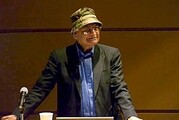 Home
News
Vision
The 7 Phases
Books
Articles
Related articles
The counterforces
About Margarete
Quotes / Test
Links / Contact
Home
News
Vision
The 7 Phases
Books
Articles
Related articles
The counterforces
About Margarete
Quotes / Test
Links / Contact
|
The Basis of Evolution is Consciousness, SpiritBy Margarete van den BrinkTranslated by Philip Mees The most important questions people ask themselves in their lives include: Where do we come from? Why do we live on earth? Where are we going? In the course of time more and more different groups have given answers to these questions. Some of them contradict each other. What concepts, what notions are there? Creationists and Intelligent DesignersOn the one hand, there are the creationists and the adherents of the intelligent design view. The first embrace the idea that God created the world, whether or not in six days. The intelligent designers acknowledge that Darwin's idea of evolution contains truth but that say at the same time that evolution as a whole and in its parts is so incredibly complex that there has to be a high intelligent power working in it that has created it all. Many adherents of the intelligent design view assume that this high intelligent power is the God of the Bible. Neo-Darwinists and Evolutionary BiologistsTheir opponents are the adherents of the evolution theory of the neo-Darwinists and evolutionary biologists. They say that everything that exists has come into being by accident. Life serves no purpose, at best to hand a little piece of DNA over to the next generation. Most of the adherents of this theory abhor the idea that there would be something like a creator who created the earth, the plants, animals, and human beings and had a certain purpose for it. Neo-Darwinist evolution and the resulting evolutionary biology are purely materialistic in nature. They completely exclude the possibility that there might be a spiritual world or a high spiritual power that has brought everything into existence and permeates and carries the world of matter. For them the only thing that is real and true is what the world of matter shows and what can be seen, heard, measured, and touched with the regular earthly senses. Everything else is unscientific, fantasy, and therefore not true. This materialistic way of viewing things has in the past hundred years deeply penetrated into our western societies and profoundly influences our thinking at all levels of life. A new view of evolutionFortunately, that is not the end of the story. Evolution also takes place in the way human beings think about themselves. In the past few decades, scientists have stepped forward who proclaim completely new theories. This makes a new view of evolution possible. These scientists say that the phenomena that occur in the development of evolution are undoubtedly correctly described by the adherents of Darwin's ideas of evolution. The fact that there is a development that begins with single cell beings and leads to the extremely complex human being is perfectly obvious. The problem however, they say, lies in the explanations and interpretations Neo-Darwinists and evolutionary biologists give to these phenomena. For you can view these phenomena in very different ways and, on that basis, come to entirely different conclusions. However, this requires you to do a number of things. In the first place, you have to take seriously those aspects of evolution and include them in your contemplations for which the Darwinists have no explanation. In the second place, you have to acknowledge the new insights from quantum physics. And in the third place, you have to allow for the possibility that there exists something like a spiritual world, in other words, a dimension of encompassing wisdom, creativity, and consciousness. Questions for DarwinistsWe find all these elements in the ideas of a number of modern scientists. Amit Goswami, professor of physics and quantum physics, as well as the well-know physician and researcher Deepak Chopra both wrote about it. “Every biologist has to be painfully conscious,” says Goswami, “that biology, the way it is presented today, is an incomplete science. What it needs are new organizing principles that are not physical and not material in their nature. For only in that way can the questions and mysteries that still exist be explained.” As questions and mysteries that still exist he mentions among others:
Deepak ChopraIn his books and lectures Deepak Chopra also asks fundamental questions of the Darwinists and evolutionary biologists. Some of these are:1
No existing scientific theory, he says, has been able to answer the above questions and dilemmas. And unfortunately, research into them within conventional science is not being stimulated. On the contrary. Scientists are being discouraged from occupying themselves with these subjects. Spiritual image of the human being and the worldPeople like Chopra, Goswami, and a number of other scientists have in common that they dare to raise these kinds of questions openly. And that is no small thing in the scientific world where you can be ridiculed and tripped up by your colleagues. But they also share something else. They base themselves—first of all for themselves personally—on a spiritual image of the human being and the world. Copra and Goswami have a Hindu background. Others I know embrace Buddhism or Anthroposophy. Their spiritual image of the human being and the world does not constrict these scientists but opens the possibility for them to think as scientists outside the conventional materialistic-scientific frameworks. In this way they arrive at extremely surprising discoveries that lead to completely new insights. In brief, science and spirituality, or science and the spiritual world do not exclude each other but can, provided a few conditions are met, complement and reinforce each other. Discoveries in quantum physicsThe medium that helps these researchers to come to these renewing insights are the spectacular discoveries quantum physics has produced in the past few decades. Quantum physics is a relatively young science that, especially after 1900, was developed by scientists such as Albert Einstein and Max Planck. The characteristic aspect of this science is that it takes place on the boundary between the world of matter and the spiritual world. Quantum physics scientists discovered that all matter, the cores of atoms also therefore, consists primarily of empty spaces, and that what then remains behaves like waves of energy. In its primal form, matter turns out to be energy (quanta) and also manifest as light. And not only that, the very smallest “particles” that form matter turn out to be carriers of information—information that indicates what has to happen and actually brings this about from the inside out. For example, every cell in the human body “knows” what I has to do, but also how it has to work together with other cells so that there can be an organ such as the liver or the lungs. And not only that, it also “knows” how that organ has to be maintained. Information that behaves in this way is called “consciousness.” Another word for it is “spirit,” and another word again is “wisdom.” Consciousness is the primal source from which everything has come into being. We might also describe this information, which is present in matter, as in-formation — formation from inside out — consciousness in matter that creates and forms it from inside out… When you realize that this is the case in all living beings, such as plants, animals, and human beings, you can only come to the conclusion that consciousness is the primal ground of all matter and is the foundation of all that is. Chopra, Goswami, and many others have come to that conclusion and made it the basis of their theories. They say: Consciousness is no side-effect of evolution and did not arise accidentally like the Darwinists think, but the reality from which everything has come into existence. This consciousness is not “local,” meaning that it is not bound to a place. It exists on its own. Limitless in place and time, it is infinite and everywhere present. The entire cosmos and the earth and all that lives on it is permeated with it and have their place in consciousness. Consciousness is primary; matter is secondary. The latter came out of the former. Spirit precedes matter and not the other way around. For this reason, consciousness is not, as Darwinists think, only bound to the physical body. Their opponents say: It does not originate from it, but it is indeed closely connected with it. Because encompassing consciousness is connected with our physical body, specifically with our brain, we are able to think and become conscious of ourselves and the world around us. Chopra: “We human beings are the only beings that are conscious of their own consciousness. That consciousness exists beyond the physical world, the world of matter. You cannot find it in the body, and it lies in a deeper place than our thinking. It is the breeding ground of our thinking.” The interesting thing is that these findings confirm what esoteric tradition, the age-old wisdom from East and West, has proclaimed for many thousands of years, namely that everything that exists has its origin in all-encompassing consciousness or spirit. The scientists I have referred to in this article also point this out. Goswami2 says that it is therefore important for scientists who are looking for new insights that transcend materialism, to consult this ancient wisdom. He expects that there is much insight and information to be found in spiritual literature that can clarify the nature of consciousness and its manifestations in the world of matter.
|












